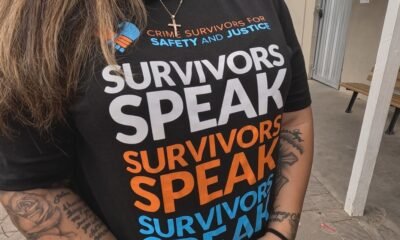border
DHS Closes ‘Open Door’ for Women and LGBTQ+ Immigrants to Seek Abuse Help

This story was originally reported by The 19th.
The Trump administration has significantly reduced the powers of three crucial oversight offices within the Department of Homeland Security (DHS), agencies long credited with protecting immigrant victims of gender-based violence, including domestic abuse survivors and LGBTQ+ individuals facing discrimination. Advocacy groups are concerned that these changes will hinder the rights and protections that vulnerable populations rely upon amid a backdrop of increasingly aggressive deportation policies.
In a major restructuring, the administration terminated dozens of staff members from offices responsible for civil rights enforcement and oversight of detention and immigration policies. According to The New York Times, this decision led to the loss of more than 100 jobs within DHS. As a result, the current staffing levels and operational capabilities of these offices remain uncertain.
A senior spokesperson for DHS claimed that the agency remains committed to civil rights protections but asserted that the offices targeted for cuts had obstructed immigration enforcement efforts. Despite this claim, DHS did not clarify how many personnel are still active in these essential oversight roles or their ability to handle ongoing complaints.
The Office for Civil Rights and Civil Liberties played a pivotal role in addressing abuses against immigrant populations. Aaron Morris, executive director at Immigration Equality, emphasized that this office provided mechanisms for reporting and mitigating abuses. Its diminishment leaves advocates concerned about a lack of accountability for potential wrongdoings by agency personnel.
Moreover, the Council on Combating Gender-Based Violence, an entity that supported victims of various forms of violence, has had its resources significantly compromised. The main webpage detailing its mission is now inaccessible through the agency’s website, casting doubt on its current functionality.
Irena Sullivan, senior immigration policy counsel at the Tahirih Justice Center, highlighted the immediate consequences of these staffing cuts. Her organization previously worked closely with the office to advocate for individual cases and to address systemic issues affecting immigrant victims. Past initiatives, such as a “know your rights” pamphlet created in collaboration with DHS, provided vital resources detailing the legal rights of victims.
Previously, DHS had ensured strict confidentiality concerning vital information, thus protecting victims from potential retribution by abusers. However, the current restructuring raises concerns about whether such protections will still be upheld.
In relation to prior oversight actions, advocates reported cases where border agents confiscated necessary medications for trauma survivors. Advocacy interventions once led to new policies that safeguarded the health rights of these individuals, but without an operational oversight office, future protection of these rights appears uncertain.
In addition to the aforementioned offices, DHS has also eliminated an online archive of past investigations, which often validated claims of abuse or highlighted systemic issues needing correction. While these offices were not always effective, their existence offered a crucial check against abuses that marginalized communities faced.
Although advocates have noted a degree of inefficacy in these oversight mechanisms, they served a critical function in engaging with DHS on serious civil rights violations. For instance, in 2022, numerous organizations filed complaints against Houston’s Asylum Office for its failure to follow guidelines concerning vulnerable asylum seekers.
However, following the recent staffing reductions, advocates face an uphill battle in seeking redress. Morris noted that questions remain about the agency’s capacity to handle a backlog of civil rights complaints. “They’re still accepting complaints, but I don’t know how they would prioritize or triage,” he remarked, highlighting the confusion surrounding their operational status.
In summary, as advocates explore how to navigate this new landscape, the immediate and long-term effects on victims are concerning. The potential for litigation may increase, a costly and time-consuming solution that advocates hope to avoid, yet it appears to be the only available recourse in the absence of a responsive watchdog within the federal government.


















